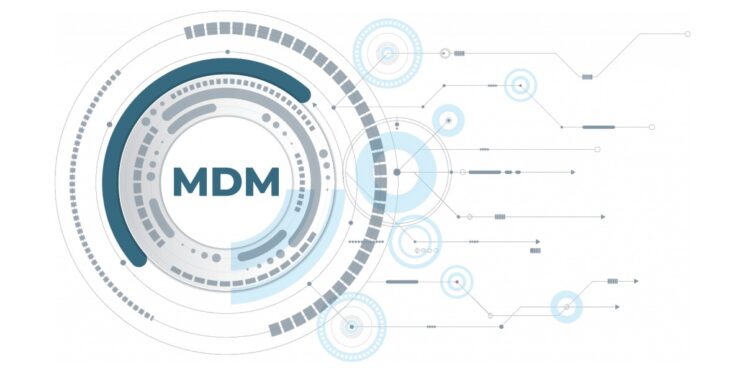Data has become a valuable commodity that organizations worldwide seek to use to gain a competitive advantage. However, with the ever-increasing volume of information, it becomes a complex task to manage, store, and protect this sensitive information.
Therefore, organizations must adopt policies, technologies, and practices that can effectively govern and manage their data. This is where data governance, technology, and master data management come into play.
This blog post will explore the intersection of data governance solutions, technology, and master data management and how these concepts work together to manage an organization’s data.
In This Post
Data Governance

It involves the creation of policies and processes that enable your organization to manage information optimally, ensuring data quality, accuracy, confidentiality, and security. Data governance establishes responsibilities and authority across the organization to ensure information is handled per predefined rules and standards.
In the era when organizations produce voluminous data, ensuring it’s governance is more necessary than ever. A well-structured governance strategy helps organizations comply with privacy regulations, develop quality standards, and ensure data is easily accessible and shareable across departments.
Governance tools assure stakeholders that the organization’s data is managed ethically and effectively.
Data Technology
Data technology is the hardware and software necessary to assimilate, store, and consume it effectively. Technology is crucial because it enables access, analysis, and insights that convert raw data into valuable information that is both useful and usable.
The industry has made startling advancements in technology, including the IoT (Internet of Things), BI (Business Intelligence), and AI (Artificial Intelligence) just to name a few examples.
Data technology indicates how organizations depend on and can manipulate information. Adopting and integrating cutting-edge data technology have increased efficiency, saved money, and provided a competitive edge.
Master Data Management
Master data management refers to managing the most critical data of an organization that forms the foundation of business operations. Examples of master data include customer, employee or product data. Master data management plays a crucial role in ensuring it’s quality, consistency, and governance.
The challenge with master data is that it is often spread across thousands of systems, applications, geographic locations, and data silos. Without proper master management, getting a complete view of customer profiles, sales trends, or financial status becomes impossible.
The ability to have access to complete and accurate master data can provide an organization with a competitive edge.
Intersection Of Data Governance, Technology, And Master Data Management

While each component has its unique role, they are all connected and must be implemented together to be effective. Such an implementation approach can lead an organization to success.
A well-designed framework that enables data governance provides policies and procedures for effective management. Technology provides tools and technology to connect, store, classify, and access information.
This technology relies on master data management to ensure the accuracy and consistency of the information it consumes and produces.
Challenges and Opportunities in Data Governance and Management
In the realm of data governance and management, challenges are as prevalent as opportunities. One major challenge is ensuring data privacy and security in an age where cyber threats are increasingly sophisticated. This necessitates robust security measures and compliance with various data protection regulations. On the flip side, effective data governance offers numerous opportunities, such as enhanced data quality and integrity.
By establishing clear governance structures, organizations can improve their decision-making processes and gain insights that were previously obscured by data silos or poor data quality. This section will delve into these challenges and opportunities, providing examples and strategies for overcoming the obstacles while capitalizing on the potential benefits.
Integrating Emerging Technologies in Data Management
The integration of emerging technologies like blockchain, cloud computing, and machine learning in data management represents a significant shift in how organizations handle their data. Blockchain technology, for instance, offers a decentralized and secure way of managing data, which is particularly beneficial for ensuring data integrity and traceability.
Cloud computing facilitates greater scalability and accessibility of data, while machine learning algorithms can help in analyzing vast amounts of data to glean actionable insights. This section will explore how these technologies are being integrated into data governance and master data management, highlighting their benefits and discussing the best practices for their implementation.
Future Trends in Data Governance and Master Data Management

Looking ahead, the landscape of data governance and master data management is set to evolve with advancements in technology and changes in regulatory environments. One key trend is the increasing use of artificial intelligence (AI) in automating data governance processes, which can lead to more efficient data management and compliance.
Additionally, there is a growing emphasis on ethical data management practices, particularly in the context of big data and AI. This section will discuss these future trends, providing insights into how organizations can prepare for and adapt to these changes. It will also touch on the implications of these trends for data privacy, security, and overall business strategy.
The Role of Data Governance in Driving Innovation and Collaboration
Data governance plays a pivotal role in fostering innovation and collaboration within organizations. By establishing clear guidelines and frameworks for data usage, data governance ensures that data is not only secure and compliant but also accessible and usable for innovation purposes. This enables organizations to harness the full potential of their data, driving new product developments, improving customer experiences, and facilitating cross-functional collaboration.
Moreover, effective data governance creates an environment where data can be shared and utilized across departments without compromising its integrity. This section will discuss how data governance can be a catalyst for innovation, illustrating with case studies and examples how organizations have leveraged their data governance strategies to fuel collaborative projects and innovative solutions.
Final Thoughts
Data governance, technology and master data management are essential to modern businesses. Organizations that adopt these practices find that they can effectively manage their information and use it to gain a competitive advantage. With technologies such as governance software, catalogs, and data lineage tools, organizations can ensure their valuable information is protected, stored appropriately, and used ethically.
Data governance, technology, and master data management help organizations leverage the power of their data and turn it into a strategic asset that can inform decision-making, improve operational efficiency, and ultimately drive business growth.